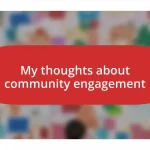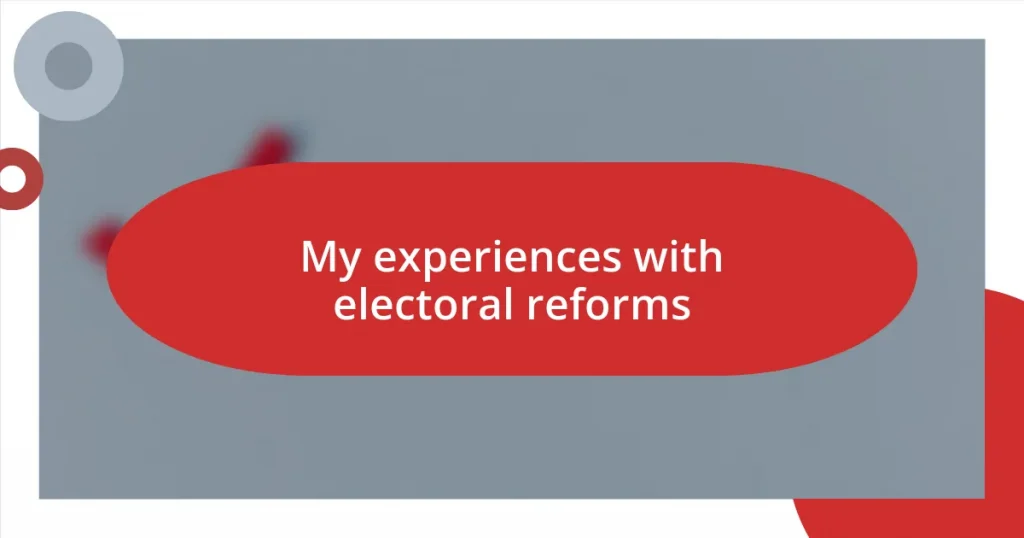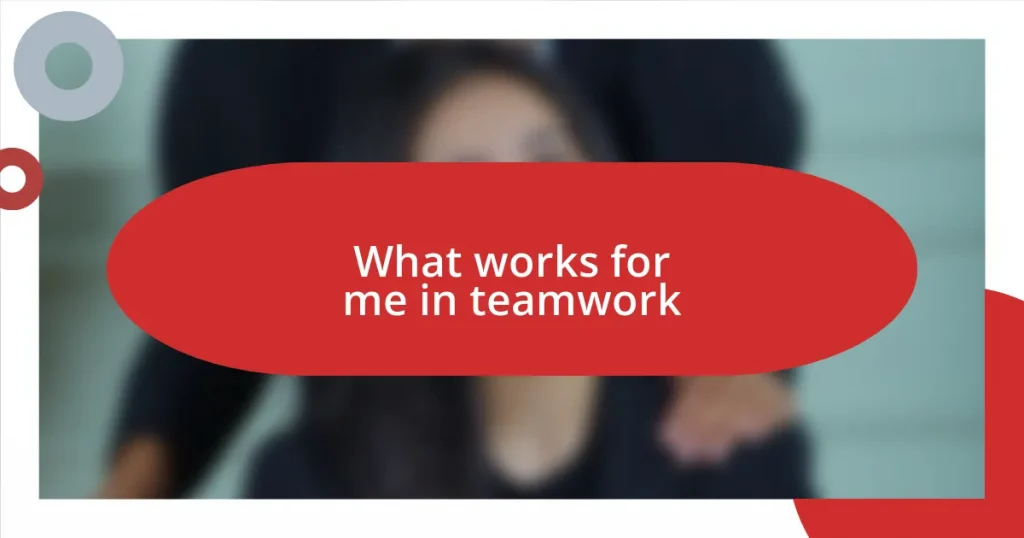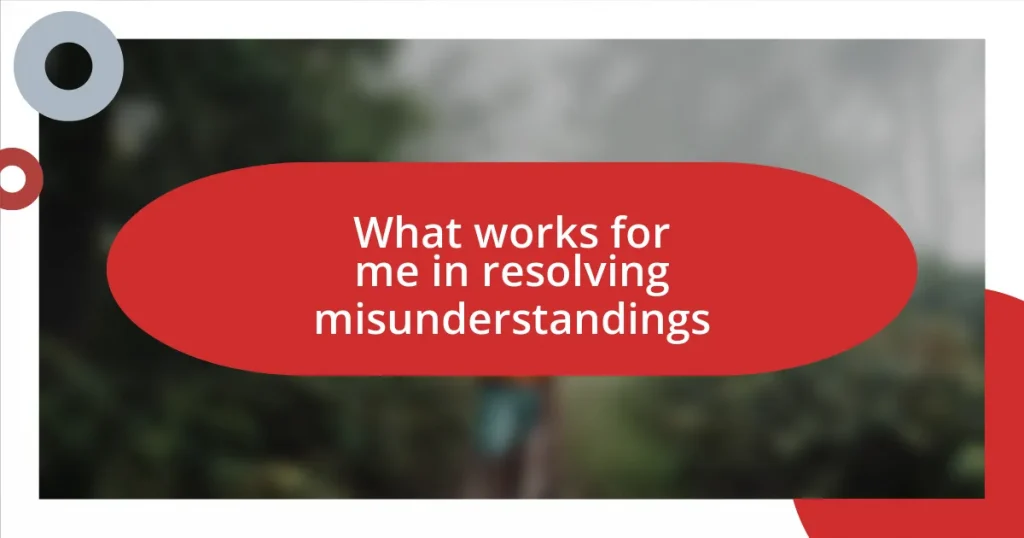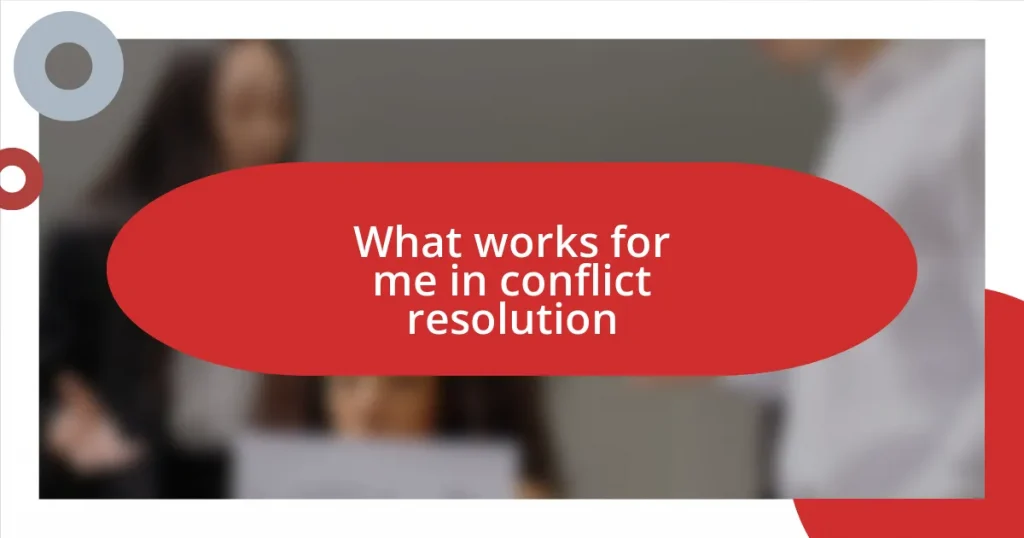Key takeaways:
- Electoral reforms, like ranked-choice voting and automatic voter registration, empower voters to make authentic choices and simplify participation.
- Challenges such as resistance from political factions and the need for effective communication highlight the complexities of implementing reforms.
- Engaging marginalized communities is crucial, requiring trust-building and tailored outreach to ensure effective participation in the electoral process.
- The future of electoral reforms is shaped by youth activism and social media, enhancing engagement and transparency in the democratic process.
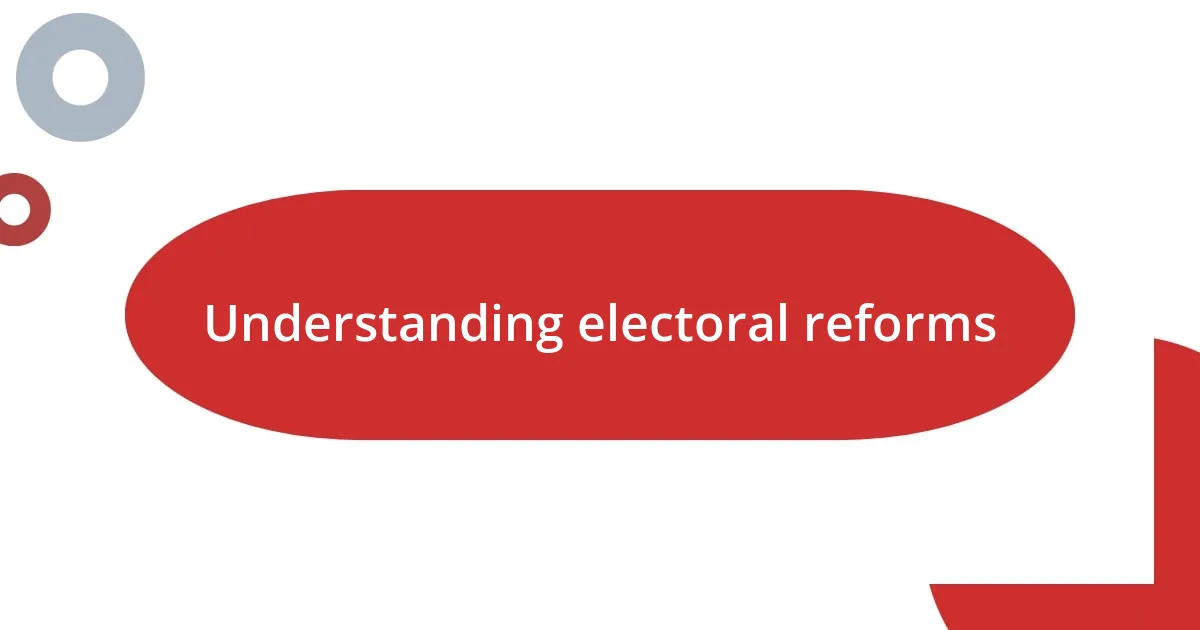
Understanding electoral reforms
Electoral reforms are essential changes to the electoral system, aimed at enhancing fairness and representation. I remember attending a town hall meeting where community members passionately debated proposed changes to our voting process. It struck me how deeply these reforms could influence our democratic engagement and individual voices.
Through my experience, I’ve seen how different electoral systems can yield drastically different outcomes. For instance, after a local election implemented ranked-choice voting, I witnessed voters feel empowered to support candidates they genuinely aligned with, rather than simply choosing the lesser of two evils. Isn’t it powerful to think about how one reform could shift our perceptions of political legitimacy?
Reflecting on my encounters with electoral reforms, I often ponder the complexities involved in implementing change. There are those who view reforms as a threat to the status quo, while others see them as a beacon of hope. How do we strike a balance between tradition and progress to create a more inclusive political landscape? The discussions I’ve engaged in reveal that these reforms can spark vital conversations and provoke meaningful action within our communities.
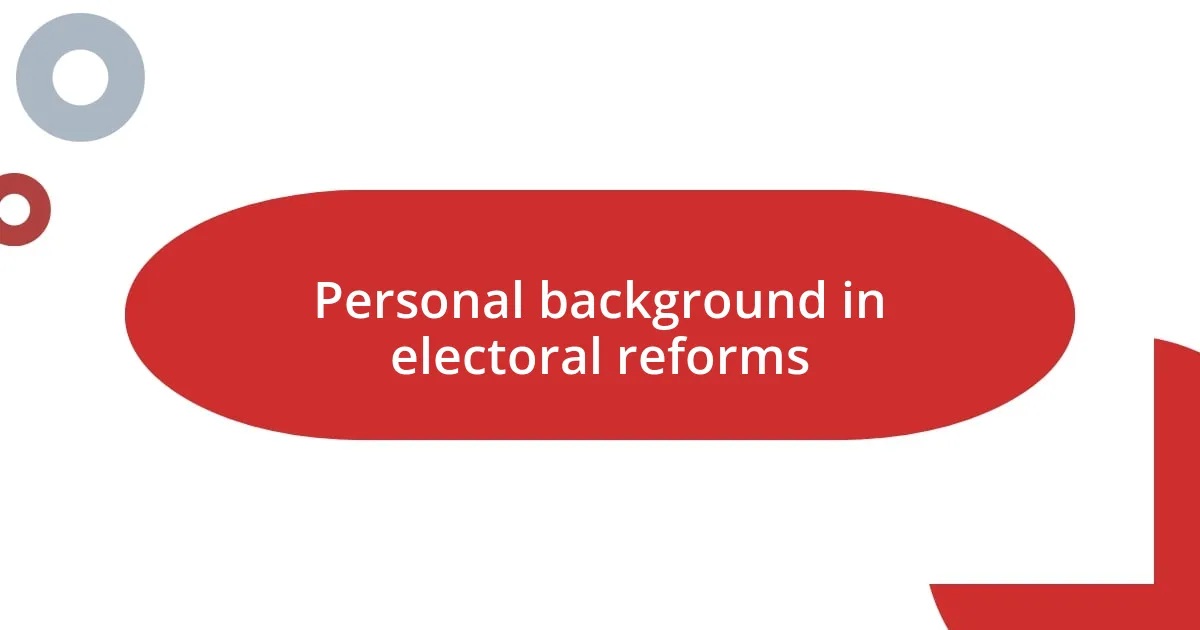
Personal background in electoral reforms
In my journey with electoral reforms, I’ve engaged with many initiatives that shaped my understanding of our democratic process. I clearly remember volunteering with a grassroots organization advocating for easier access to voting. The energy in those rooms, filled with motivated individuals from diverse backgrounds, ignited a passion in me for ensuring everyone has a voice. It’s astonishing how a single initiative can unify a community around a common purpose, revealing the human side of political engagement.
- I participated in a campaign that sought to reduce barriers to voting, such as cumbersome registration processes.
- I attended workshops, hearing firsthand experiences from marginalized communities about the challenges they faced when trying to vote.
- My interaction with local leaders opened my eyes to the complicated interplay of policy and public opinion, emphasizing the importance of dialogue in the reform process.
- I’ve seen how embracing reforms like automatic voter registration can simplify participation for many, bringing more citizens into the democratic fold.
Each of these experiences was not just an event; they were moments of growth that deepened my commitment to advocating for reforms that reflect the voices of all citizens.
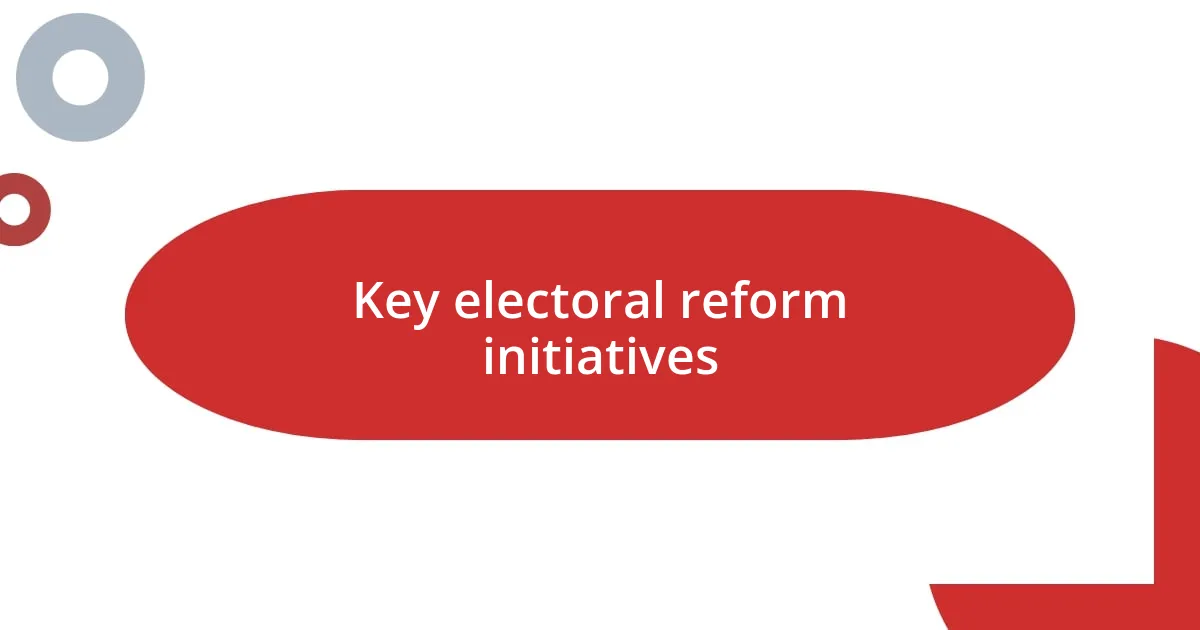
Key electoral reform initiatives
Reforms aimed at increasing voter participation have been pivotal in shaping our electoral landscape. One initiative that stood out to me was the introduction of early voting. I recall waiting in line at my local polling station during a primary election, only to find it packed as people rushed to cast their votes. When early voting became an option, those long lines were replaced with a steady stream of voters over days, empowering everyone to find a time that fit their schedules. This shift not only alleviated the chaos but also made voting feel less like an obligation and more like a personal choice.
Another effective reform I witnessed was the implementation of mail-in ballots. I remember how families gathered around the kitchen table, discussing candidates while filling out their ballots together. This communal experience changed the dynamic of voting, allowing for deeper conversations about our choices. The convenience of mail-in voting helped increase turnout, especially among those who previously found it challenging to make it to polling places.
Finally, I can’t help but reflect on the importance of voter education initiatives. I once attended a community workshop where we delved into understanding ballot measures and candidates. The transformation in people’s engagement was palpable—questions flowed, and enthusiasm bubbled as attendees became informed participants in democracy. This proactive approach not only empowered individuals but also nurtured a sense of responsibility and connection to the electoral process.
| Electoral Reform Initiative | Description |
|---|---|
| Early Voting | Allows voters to cast their ballots in person before election day, reducing long lines and increasing accessibility. |
| Mail-in Ballots | Enables voters to receive and submit their ballots via post, making it easier for those unable to reach polling stations. |
| Voter Education | Initiatives that inform citizens about candidates and ballot measures, fostering informed decision-making. |
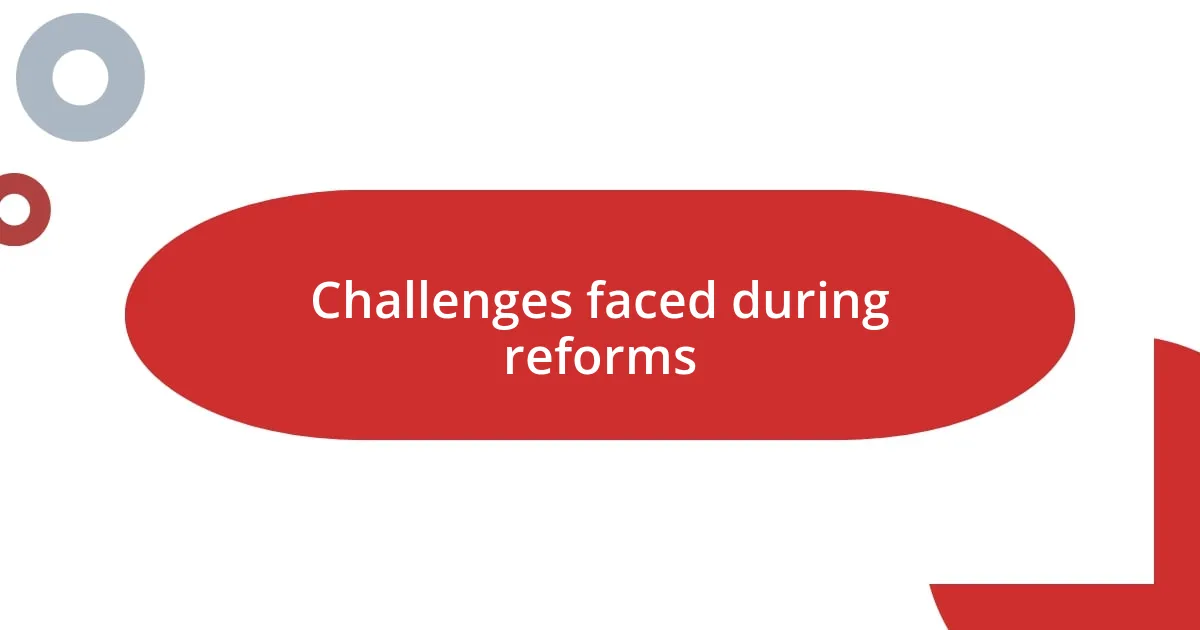
Challenges faced during reforms
When grappling with electoral reforms, one notable challenge I faced was the resistance from established political factions. I vividly remember being in a heated discussion where some local leaders fiercely opposed automatic voter registration. Their concerns revolved around the fear that it could lead to fraudulent voting. It struck me as ironic that their desire to maintain control overshadowed their commitment to accessibility. Have you ever experienced a situation where fear of change held back progress?
Throughout this journey, I also witnessed the struggle of effectively communicating the benefits of reform to the public. At a community meeting, I presented the advantages of mail-in ballots, hoping to spark excitement. However, the mood shifted when a skeptical resident asked, “How can we trust that our votes will be counted?” It made me realize how deeply rooted mistrust can derail even the most well-intentioned initiatives. It’s a potent reminder that effective outreach and education are not just beneficial but essential.
Moreover, engaging marginalized communities presented its own unique set of challenges. I recall organizing a workshop aimed at educating underrepresented groups on their voting rights. Despite our best efforts, turnout was low. I wondered, what are we missing? It became clear to me that building trust and understanding the specific needs of each community is crucial. This experience taught me that reforms can’t just be about policy changes; they need genuine outreach and connection to be truly effective.
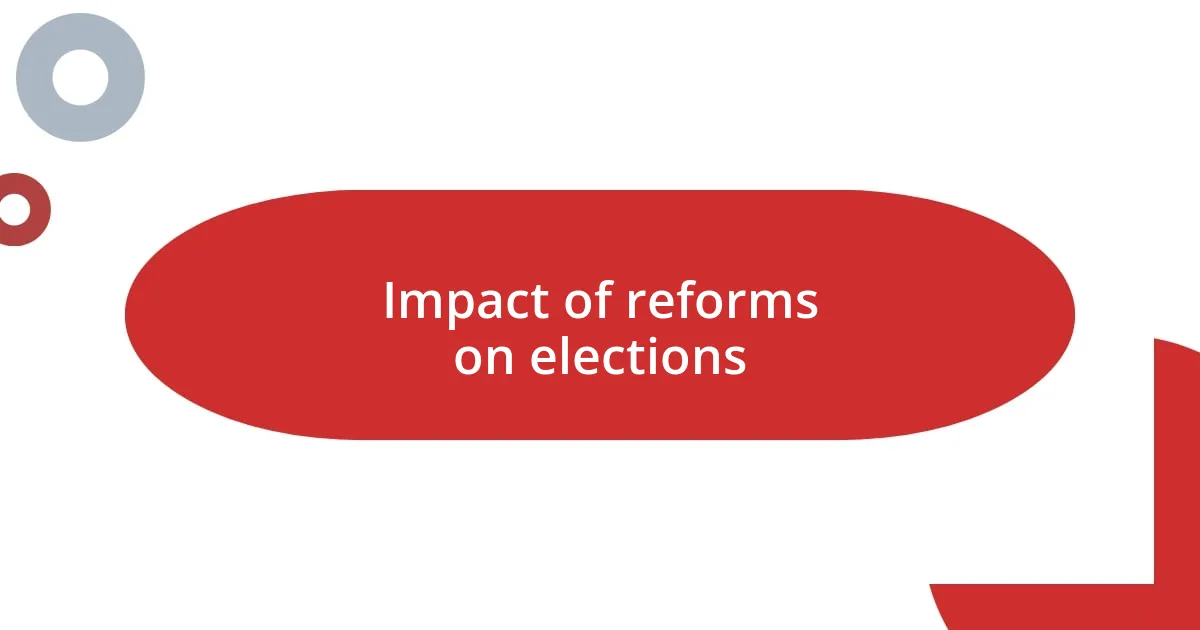
Impact of reforms on elections
The impact of electoral reforms on elections is, in many ways, transformative. I remember attending a town hall meeting after the introduction of weekend voting. The atmosphere was electric as people shared their experiences. One father told how he felt relieved to finally bring his kids along with him to vote on a Saturday. It wasn’t just about convenience; it fostered family discussions about civic duty, making the act of voting a shared experience. This small change significantly enhanced community engagement, didn’t it?
In my view, the most profound effect came from initiatives focusing on accessibility. After the introduction of language assistance at polling places, I heard from a first-time voter who spoke limited English. She expressed how the support she received made her feel included in the electoral process. It struck me that empowering individuals through tailored resources not only enhances participation but also cultivates a sense of belonging in our democracy. Isn’t it fascinating how a simple adjustment can create such a ripple effect in people’s lives?
Moreover, the role of technology in streamlining voter registration cannot be understated. I recall the excitement surrounding the launch of an online registration platform. Friends shared their experiences of signing up from their couches, marveling at how easy and efficient it felt. This shift was not merely about modernizing the system; it represented a significant step toward inclusivity, especially for younger voters who value convenience. How many more voices could we hear if reforms continue to embrace innovative solutions? It’s a thought that encourages continued evolution and adaptation in our electoral systems.
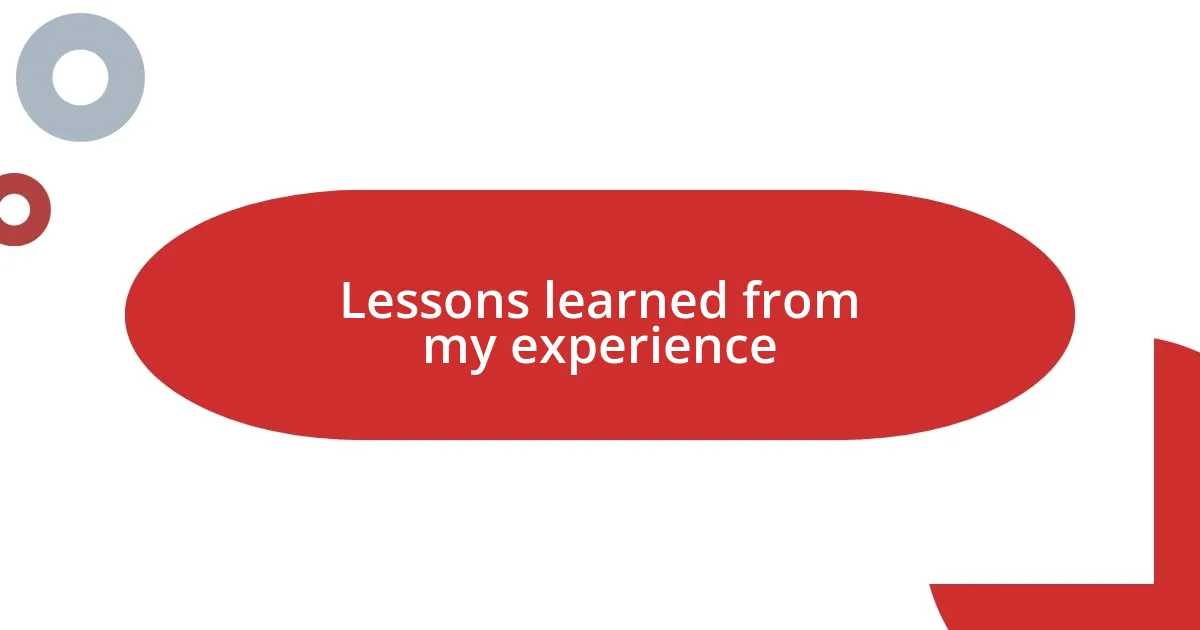
Lessons learned from my experience
I learned that patience is crucial when navigating the intricacies of electoral reforms. For instance, during a local debate on implementing ranked-choice voting, I witnessed heated discussions that stretched late into the night. I felt the tension in the room and realized that change takes time, and sometimes, the most passionate advocates need to take a step back and listen. Have you ever felt the struggle of wanting progress but having to wait for consensus to be reached?
Another lesson emerged from the importance of storytelling. When I spoke about my journey as a young voter navigating the old system, I noticed how it resonated with many attendees. One woman shared her own experience of feeling lost during elections. This exchange highlighted how personal narratives can foster connection and motivate others to embrace reform. Isn’t it fascinating how sharing our stories can unite us in a common cause?
Lastly, I found that collaboration truly amplifies impact. Partnering with advocacy groups allowed us to pool resources and reach a broader audience. I remember our joint campaign for early voting, where each organization brought something unique to the table. The collective enthusiasm and diverse perspectives helped us energize community discussions around voting options, reinforcing the idea that working together can make significant strides. Have you experienced moments where teamwork transformed an initiative’s success?
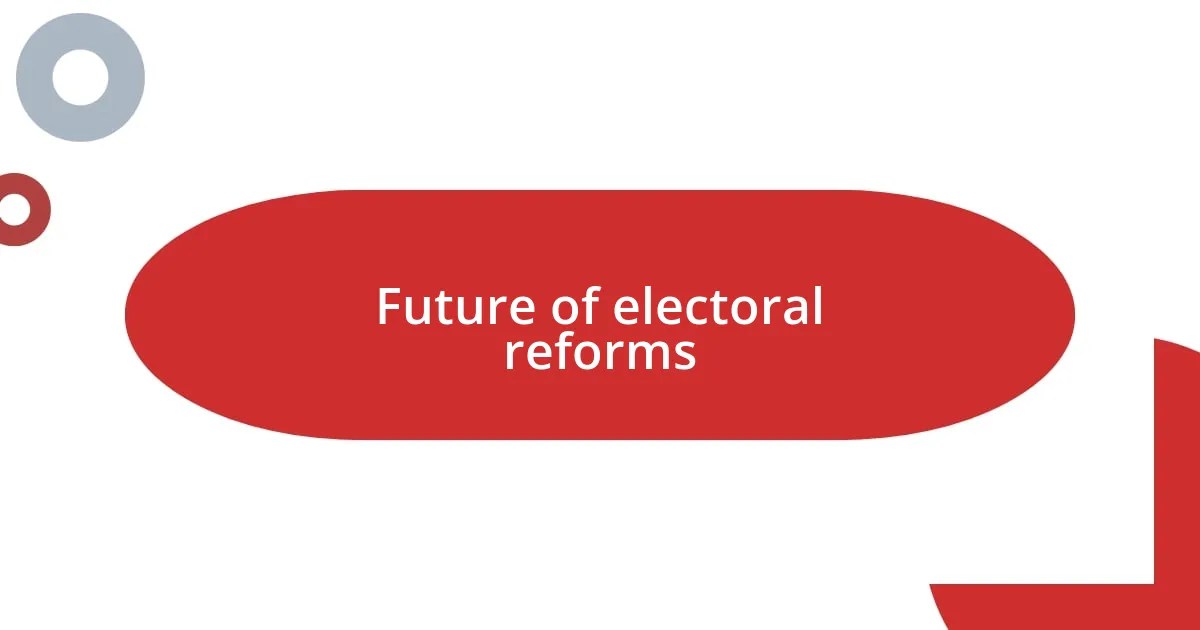
Future of electoral reforms
The future of electoral reforms is ripe with potential, reflecting our changing society. I’ve often thought about the power of youth activism as I’ve seen young people passionately advocate for issues like automatic voter registration. Their presence at rallies and protests is inspiring, and it makes me believe that reforms will increasingly center around the voices of the next generation. What could happen if we let them take center stage in shaping our electoral landscape?
I can’t help but wonder about the role of social media in the evolution of voting practices. During a conversation with a friend, we discussed how platforms like Instagram are giving rise to online voter drives that engage people who might usually feel disconnected. This digital approach could make electoral participation not just a duty but also a part of cultural expression. Isn’t it fascinating how these platforms can transform political engagement and make it feel more relevant to everyday life?
Moreover, I see a growing trend toward increased transparency in the electoral process. I remember reflecting on a recent town hall meeting that featured a live discussion about campaign financing. The candid conversations about money in politics resonated with many, sparking a desire for more oversight and accountability. The shift towards advocating for clear regulations might strengthen trust in our electoral system, and I can only hope it leads to a more informed electorate. What changes would that trust inspire in the way we perceive our political leaders?









